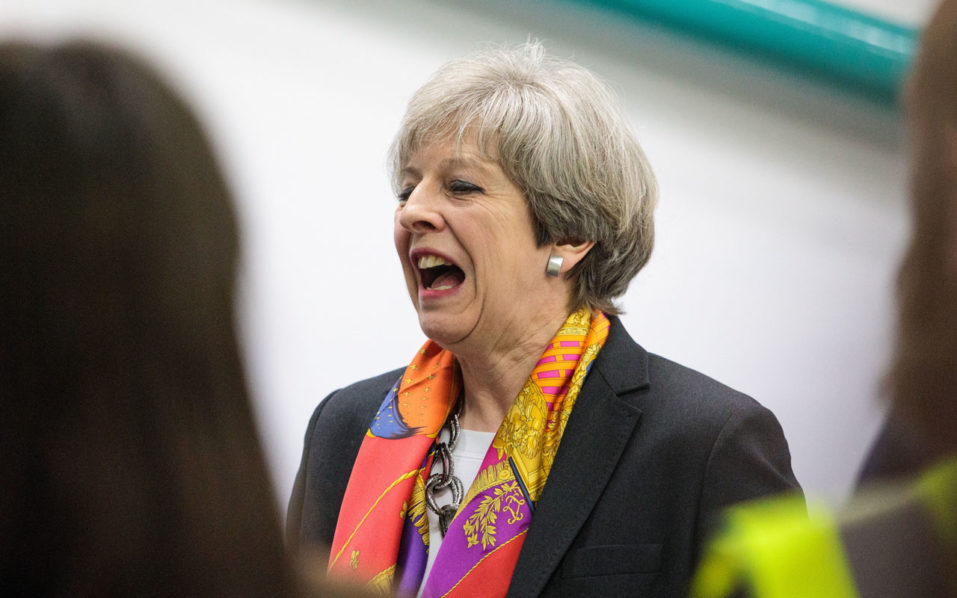
Theresa May’s Conservatives made significant gains Friday in Britain’s local elections, handing the prime minister a boost ahead of next month’s Brexit-dominated parliamentary polls.
Results, albeit on low turnouts, showed the governing Conservatives dealing heavy blows to the main opposition Labour Party and all but wiping out the anti-EU, anti-mass immigration UK Independence Party (UKIP).
Despite the thumping results, May said there was no room for complacency ahead of the June 8 general election and the EU divorce negotiations to come afterwards.
“It’s encouraging that we’ve won support across the whole of the UK but I will not take anything for granted and neither will the team I lead, because there is too much at stake,” she said.
“This is not about who wins and who loses in the local elections: it is about continuing to fight for the best Brexit deal.
“Despite the evident will of the British people, we have bureaucrats in Europe who are questioning our resolve to get the right deal.
“I will continue my efforts to earn the support of you, the people.”
May’s decision to call an early general election ensured her own record and Brexit would be on voters’ minds when they went to the polls on Thursday to choose nearly 5,000 new local councillors.
The prime minister lashed out at Brussels on the eve of the elections, but EU president Donald Tusk warned against letting “emotions get out of hand” before formal Brexit negotiations get under way.
However, May’s tough-talking approach to Brexit appears to have translated into votes.
With 82 of the 88 local authorities declared, the Conservatives had 1,776 seats, a net gain of 510, according to the Press Association news agency.
Labour had 954 seats — a net loss of 290 — while the smaller, pro-EU Liberal Democrats, who had been hoping to pick up some momentum ahead of June’s parliamentary election, had 388 seats, a net loss of 32.
– Conservatives consume UKIP vote –
The Scottish National Party (SNP) were on 359 seats, a net gain of 11.
Meanwhile UKIP had only one seat, a net loss of 109, falling “victim to its own success”, according to party leader Paul Nuttall.
Nuttall, who is hoping to secure a seat in parliament next month, put the anti-Brussels party’s electoral woes down to the Conservatives’ tough stance on Brexit.
“If the price of Britain leaving the EU is a Tory advance after taking up this patriotic cause, then it is a price UKIP is prepared to pay,” he said.
Labour suffered a big blow in Glasgow, one of its traditional heartlands, where it lost overall control of the city council.
But it secured the mayorships of greater Manchester and Liverpool, two of six metropolitan conurbations to elect a mayor for the first time.
John McDonnell, the right-hand man of Labour leader Jeremy Corbyn, said the results were not “the wipe-out people had expected”.
– Realignment benefits May –
Eric Kaufmann, a politics professor at the University of London, said May’s Brexit stance seemed to be paying dividends with a realignment towards her party.
“The Conservatives have managed to pull in people who voted Leave (in the EU referendum) while retaining Remainers,” he told AFP.
UKIP’s vote was “bleeding off to the Conservatives”, while the Lib Dem failure to capture Remain voters was a “big surprise” and a “disappointment” for the centrist party.
Meanwhile in Scotland, where the SNP is raising the prospect of a second independence referendum, “the unionist vote seems to be consolidating behind the Conservatives and away from Labour”, he said.
The BBC produced a projected national share of the vote –an estimate of how the local elections might have gone if all areas of Britain had been voting.
It put the Conservatives on 38 percent, Labour on 27 percent, the Liberal Democrats on 18 percent and UKIP on five percent.
[ad unit=2]
One seat in Northumberland, northeast England, had to be decided by drawing straws, following a tie.
The drummer from pop group Blur Dave Rowntree, meanwhile, was elected to Norfolk County Council in eastern England, representing Labour
And in Scotland the Rubbish Party — focused on anti-littering – won a seat.



